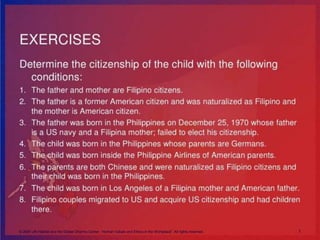
Citizenship.ppt
- 1. © 2005 UN-Habitat and the Global Dharma Center: “Human Values and Ethics in the Workplace”. All rights reserved. 1
- 3. Alien Citizen of a country who is residing in or passing through another country.
- 4. Citize n Person having the title of citizenship. Member of democratic and political community.
- 5. Citizensh ip Constitutional or legal identity of a person.
- 6. Nation al Person who owes allegiance and is entitled to the protection of a given state.
- 7. Nationalit y Reveals his/her place of birth, from where he/she belongs.
- 8. Basis for Comparison Nationality Citizenship Meaning Nationality is the individual membership that shows a person's relationship with the the state. Citizenship is the political political status, which states that the person is recognized as a citizen of of the country. Concept Ethnic or racial Legal Ways Birth and Inheritance Birth, Inheritance, Marriage, Naturalization Can it be changed? No Yes Can it be reversed? It is innate. It can be reversed. Can it be possible to have nationality/citizenship of multiple countries? No, a person can be national of only one country. Yes, a person can become a citizen of more more than one country.
- 9. Who are the Filipino citizens? Those who are citizens of the Philippines at the time of the adoption of this Constitution; Those whose fathers or mothers are citizens of the Philippines; Those born before January 17, 1973, of Filipino mothers, who elect Philippine citizenship upon reaching the age of majority; and Those who are naturalized in accordance with law.
- 10. Two Categories of Philippine Citizens Natural born Naturalized born
- 11. Principles Determining Citizenship By Birth Jus Sanguinis Jus Soli/Loci Naturalization The legal act of adopting an alien and clothing him with the rights that belong to a natural-born citizen.
- 12. Qualificatio ns Must not be less than 18 years of age. Must have resided in the Philippines for a continuous period of not less than 10 years. Must be of good moral character, and believe in the principles underlying the Philippine Constitution. Must have lucrative trade. Able to speak and write English or Spanish, and any one of the Philippine languages. Must have enrolled his minor children in any recognized schools, teaching Phil. History, government, and civics.
- 13. Ways for Naturalization The courts The Office of Solicitor General An act of Congress
- 14. Disqualificatio ns Opposition to the government Defending or teaching the propriety of violence Polygamists or believers in the practice of such Convicted of a crime involving moral turpitude Suffering from contagious and incurable disease, or mental alienation Have not mingled socially with the Filipinos Citizens of nations with whom the Philippines is at war Citizens of nations who do not grant reciprocity on citizenship
- 15. Loss of Citizenship Naturalization in a foreign country Express renunciation of citizenship Oath of allegiance to a foreign country By rendering service in the Armed Forces of a foreign country Being a deserter of the armed forces.
- 16. Loss of Citizenship When certificate of naturalization was found to have been fraudulently or illegally obtained By permanent residence in the country of origin within five years from naturalization Defects on petition for naturalization Allowing himself to be a ‘dummy’ for aliens.
- 17. Reacquisition of Citizenship Commonwealth Act No. 63 Direct act of Congress Repatriation Naturalization R.A. 9225 Natural-born Filipino citizens who have been naturalized as citizens of foreign country, but who who reacquired or retained their Philippine citizenship, will still be deemed natural-born.
- 18. Dual Citizenship vs. Dual Allegiance “Dual allegiance of citizens is inimical to the national interest and shall be dealt with by law.”
- 19. Situation: Fernando Poe Jr., presidential candidate in the 2004 national election, was born before January 17, 1973 out of wedlock to American Bessie Kelley and Allan Fernando Poe, Sr. a Filipino Citizen. Atty. Victorino Fornier filed a petition to disqualify FPJ for not being a Filipino citizen. Fornier argued that since FPJ is an illegitimate child, he must follow the citizenship of his American mother. Question: Is the status of the child born under the terms of 1935 Constitution material in determining his citizenship? 19